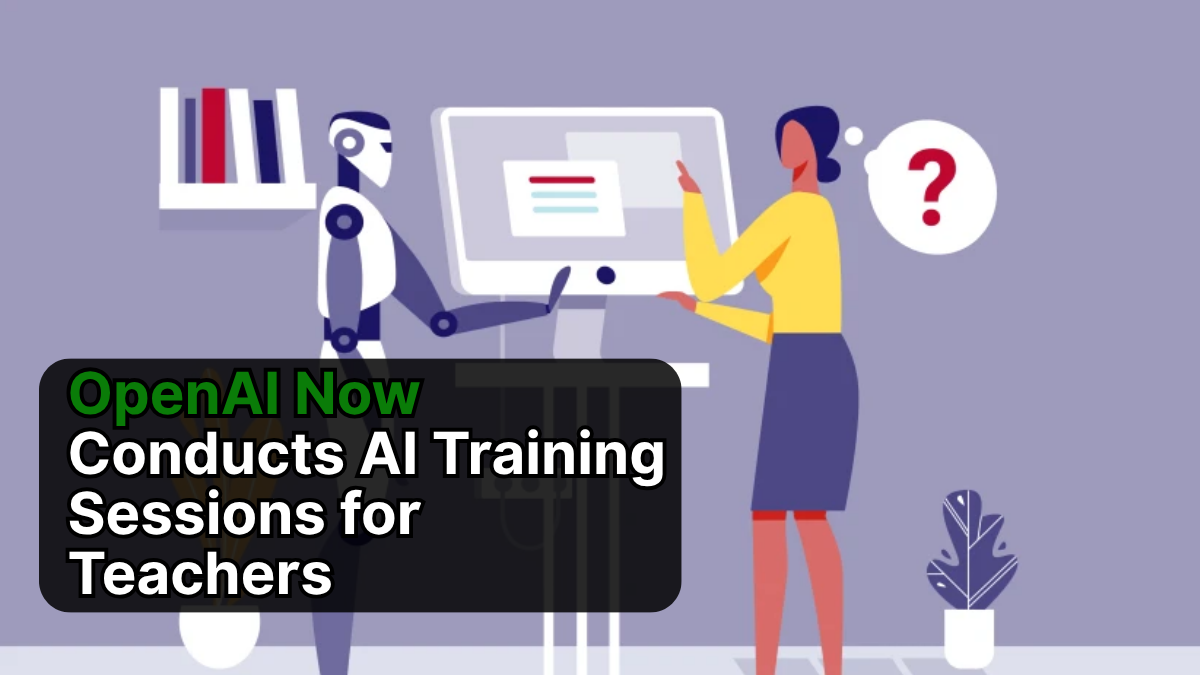OpenAI has announced a groundbreaking partnership with the American Federation of Teachers (AFT) to launch the National Academy for AI Instruction. This five-year initiative aims to train 400,000 K-12 teachers across the United States, representing nearly one in ten educators nationwide.

The collaboration marks a significant step toward preparing classrooms for the AI era, with OpenAI committing $10 million over five years to support the effort. This includes $8 million in direct funding and $2 million in engineering and computing support.
The National Academy for AI Instruction Takes Shape
The flagship training hub will open in New York City, with plans to establish additional centers by 2030. The academy will begin instruction with New York City educators this fall before expanding nationally.
Teachers participating in the program will receive:
- Free workshops and hands-on training sessions
- Continuing education credits and professional certifications
- Access to AI tools specifically designed for educators
- Ongoing support to stay current with AI advancements
The initiative places special emphasis on equity and accessibility, particularly targeting underserved school districts where AI education resources may be limited.
Major Tech Companies Join Forces
OpenAI isn’t working alone. The partnership includes support from Microsoft and Anthropic, bringing the total financial commitment to $23 million over five years. The United Federation of Teachers has also backed the initiative.
“Educators make the difference, and they should lead this next shift with AI,” said OpenAI CEO Sam Altman, reflecting on how a high school teacher first sparked his interest in artificial intelligence.
This collaboration comes as part of a broader White House-sponsored pledge signed by 68 businesses and nonprofit organizations, including Microsoft and OpenAI, to support AI skills education in schools.
AI Training Demand Surges in Schools
The timing of this partnership reflects a growing need for AI education in classrooms. Recent research from the RAND Corporation shows that the number of districts training teachers on generative AI more than doubled from 2023 to 2024.
In fall 2024, 48% of districts reported providing AI training to teachers, up from just 23% in fall 2023. RAND predicts that nearly three-quarters of districts will have provided AI training to educators by fall 2025.
This surge in demand highlights the urgent need for comprehensive, high-quality AI education programs that can reach educators at scale.
Keeping Teachers at the Center
The National Academy for AI Instruction emphasizes that teachers, not technology, should remain at the center of education. The program aims to help educators understand how AI can enhance rather than replace human instruction.
“Human beings, not the machine, are in charge of education,” said AFT President Randi Weingarten at the program’s launch event. “The tool should be one that is used by educators, by the public, by kids, not the other way around.”
The academy will address several key areas:
- Understanding how AI technology can support teaching and learning
- Exploring student safety and privacy concerns
- Preparing students for an AI-integrated economy
- Establishing ethical guidelines for AI use in education
Global Expansion Continues
While launching this major US initiative, OpenAI has simultaneously announced the first international expansion of its educational platform. The company partnered with India’s IndiaAI Mission to launch OpenAI Academy India, aiming to train one million teachers in generative AI skills.
The India program will deliver training in English and Hindi, with plans to add more regional languages. It will also extend to civil servants and include workshops, hackathons, and startup support across multiple states.
Addressing Privacy and Safety Concerns
Education privacy experts welcome the financial commitment but emphasize the need for clear guidance on safe AI use. Amelia Vance, president of the Public Interest Privacy Center, noted that teachers need training on how to use AI tools without compromising student data privacy.
For example, instead of inputting specific student information, teachers could request general resources like “five reading goals for a 5th grader with dyslexia” rather than naming individual students.
The academy plans to incorporate educator feedback and real classroom experiences to continuously improve its training programs and address emerging challenges.
Looking Ahead: The Future of AI in Education
This partnership represents more than just professional development which is a fundamental shift in how the education system prepares for technological change. By training 400,000 educators, the initiative could impact millions of students across the country.
The academy’s approach of starting with educator-led training in New York City before expanding nationally allows for testing and refinement of methods. This measured rollout could help ensure the program’s effectiveness when it reaches full scale.
As AI becomes increasingly integrated into daily life, initiatives like the National Academy for AI Instruction may prove essential for preparing both educators and students for a technology-driven future.
Preparing Educators for Tomorrow’s Classrooms
The National Academy for AI Instruction represents a crucial investment in America’s educational future. By empowering teachers with AI knowledge and tools, this partnership aims to ensure that technological advancement enhances rather than disrupts the learning process.
Success will ultimately be measured not just by the number of teachers trained, but by how effectively they can integrate AI into their classrooms while maintaining the human connections that make education meaningful.
FAQs: Frequently Asked Questions
Q. What is the goal of the National Academy for AI Instruction?
A. The Academy aims to provide 400,000 K-12 teachers with the skills and tools needed to effectively integrate AI technologies into their teaching practices, enhancing both learning outcomes and classroom engagement.
Q. How will the training be delivered?
A. The training will include a mix of online modules, in-person workshops, and ongoing support through a dedicated platform. Participants will learn through interactive courses, hands-on practice, and real-world classroom applications.
Q. Who is funding this initiative?
A. This initiative is backed by a $23 million commitment from several major tech companies, as well as additional support from OpenAI and the American Federation of Teachers (AFT).
Q. Are there any prerequisites for teachers to join the program?
A. No prior experience with AI is required to participate in the program. The curriculum is designed to accommodate educators at all levels, from AI beginners to those with some prior knowledge.
Q. How long will it take to complete the training?
A. The training is structured to provide flexibility for busy educators. Most participants will be able to complete the core modules within six to eight weeks, with additional resources available for deeper exploration.
Q. What specific skills will teachers gain?
A. Teachers will learn foundational AI concepts, how to integrate AI tools into their teaching strategies, and ethical considerations for using AI in educational settings. They will also receive guidance on fostering critical thinking in students about AI technologies.
Q. How will success in this program be measured?
A. Success will be evaluated based on how effectively teachers can integrate AI into their classrooms while maintaining meaningful human connections in their teaching methods. Feedback from educators and measurable improvements in student engagement will also serve as key indicators.
For More Information CLICK




